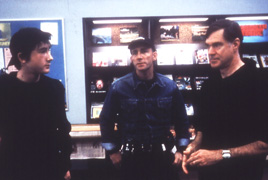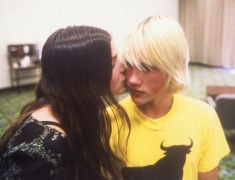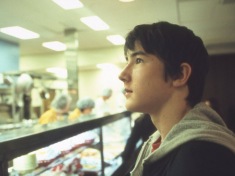|
Elephant
Interview with Gus Van Sant and Diane
Keaton
Feature and roundtable interviews by Carlo
Cavagna
|
| |
|

|
USA, 2003. Rated R. 81 minutes.
Cast:
Alex Frost, Eric Deulen, John Robinson, Elias McConnell, Jordan Taylor,
Carrie Finklea, Nicole George, Brittany Mountain, Alicia Miles, Kristen
Hicks, Bennie Dixon, Nathan Tyson, Timothy Bottoms, Matt Malloy, Ellis
E. Williams, Chantelle Chriestenson
Writer: Gus Van Sant
Director: Gus Van Sant
LINKS
|
[Read
the AboutFilm review of Elephant]
 ith
films like My Own Private Idaho, Even Cowgirls Get the Blues, Good Will Hunting,
and Finding Forrester, writer/director Gus Van Sant has explored what
it is to be young and searching for an identity. His latest, Elephant,
winner of the Palme d'Or and Best Director prizes at the 2003 Cannes Film Festival,
takes audiences inside an American high school on what appears to be an ordinary
day.
ith
films like My Own Private Idaho, Even Cowgirls Get the Blues, Good Will Hunting,
and Finding Forrester, writer/director Gus Van Sant has explored what
it is to be young and searching for an identity. His latest, Elephant,
winner of the Palme d'Or and Best Director prizes at the 2003 Cannes Film Festival,
takes audiences inside an American high school on what appears to be an ordinary
day.
What occurs is far from ordinary, however. Van
Sant has modeled his story on the infamous events at Columbine High School on
April 20, 1999, when disaffected teenagers Eric Harris and Dylan Klebold used
explosives and semi-automatic weapons to kill thirteen people and wound a couple
dozen more before turning the guns on themselves. More controversially, Van
Sant's sparsely dispassionate storytelling offers no explanation for what transpires.
As with Van Sant's previous film, Gerry,
the dialogue is entirely improvised, except that instead of using professional
actors, Van Sant has relied a cast full of real high school kids in order to
recreate a fly-on-the-wall perspective on the Columbine tragedy, which he has
reinterpreted as a fictional incident in Portland, Oregon. In so doing, Van
Sant has created one of the most realistic portrayals of high school ever filmed.

Left to right: Alex
Frost, producer Dany Wolf, and Gus Van Sant on the set of Elephant
|
In October 2003, Gus Van Sant and executive producer
Diane Keaton held a roundtable interview to discuss the making of Elephant.
Question: With Gerry and Elephant,
you may be responsible for bringing back the verité film. Is this a type
of filmmaking that you prefer over traditional narrative?
Van Sant: At this point it's something
I've been exploring. Yeah, I prefer it. Definitely. I'm going in a really weird
I-don't-know-where direction, but I prefer anything [different] from how standardized
filmmaking has become.
Question: What does it mean to you knowing
that a lot of people out there aren't going to get these movies, but that they're
going to hit a very striking chord with people they do touch?
Van Sant: Well, with Gerry, we made
it as a really low budget movie, with the idea that we didn't have to be so
self-conscious about how to make that movie's money back. We didn't have to
be self-conscious about what we were doing; we could do whatever we wanted.
There's a whole lot of films I've made that have always had the idea that not
everyone's going to go. There were some films I made with the idea that we wanted
everyone to go—Good Will Hunting and Finding Forrester, they
were designed to bring them all in. But even so, Good Hill Hunting isn't
an action movie. In the end result, if you want every single person to go—little
kids, older kids, you know, everybody—then you have to just basically make
an action movie.
Question: Good Will Hunting was
a crowd pleaser and paid off at the box office, so how did you feel at the time
when the studio heads were telling you to make it more commercial? It sounded
like there were insisting on some script changes. Wasn't Good Will Hunting
commercial-sounding enough on the page?
Van Sant: Oh no, that was just people playing
around with the script. The original one I read was fine. We made very small
changes. I can't really talk about it, but there were certain people that thought
we needed— Like, there's that old joke, "How many film executives does
it take to change a light bulb?" And the answer is, "Does it have to be a light
bulb?" It's like they all have to quote-unquote pee on the script. It was that
kind of stuff going on. It wasn't about the script not being good.
Question: So, tell us how you got started
with Elephant.
Van Sant: Well, we wanted early on to make
a film about—we thought it was going to be about Columbine High School.
Diane [Keaton] and [executive producer] Bill Robinson brought me to HBO—
Keaton: That was an interesting journey
in itself, because we had this agent who represented Gus at the time, and he
said, "Okay, look, why don't you hook up with Gus?" Well, that was a no-brainer.
Yeah, course, we wanted to do that. And so, we actually did, which is odder
still, because I've never really known Gus in all my time of being around. We
never really got to hook up. So that was a really serendipitous moment for us.
Question: What type of movie were you thinking
of creating in the early stages?

Alicia Miles comforts
John Robinson in Elephant
|
Keaton: Well, I think we wanted it to have
something to do with violence in schools. But, you know, it was a broad-based
general idea like I bet everybody else in the country was having at the same
time. It wasn't anything specific. Then when we hooked up with Gus that all
changed, because really, Gus is an artist, and we were really lucky. It was
just one of those great moments that just never happen.
Question: How did you feel after winning
at Cannes?
Keaton: How did I feel? I was utterly shocked.
I was just blown away. I was in a jet heading to Southhampton to do the end
of Nancy Meyers' movie [Something's Gotta Give], so you can imagine,
I wasn't even thinking about it. And then I get this call out of nowhere saying
that this had happened. I was like, "That's not possible!" [To Gus:]
Were you surprised?
Van Sant: Yeah, very surprised.
Keaton: But well-deserved, by the way.
In my opinion.
Question: What did you think when you heard
about Columbine? What was your immediate visceral reaction?
Keaton: My immediate reaction is, why?
That's it. Why why why why why why why? I think this movie, as well as Bowling
for Columbine, actually tries to deal with the whys of it in its own way.
What's interesting to me about Gus's movie is that he's not trying to say, "It's
because of this!" He forces you to sit there and watch it unfold before
you in this amazing way, and you have the responsibility of your own thoughts.
You have to sit there with your own fucking thoughts and think about it. That
was astonishing, because for me it was something, for Bill it was something
else, for Gus it was something else. For me, it was about being a parent, because
I'm a parent. Personally, it was devastating to watch how nobody listens. Just
really, nobody listens. And it's hard to listen when no one's talking anyway.
It drove me crazy, and I was really hit hard by it. And the pace— Enough
of me talking! Because I can just rattle on.
Question: And the dialogue was all improvised?
Van Sant: Yeah, in fact, everything that
everybody says—every single thing—is an ad lib or an improv by the
actors. There's a good example—the girls talking in the lunchroom [Nicole
George, Jordan Taylor, and Brittany Mountain] were pretty much able to do that
easily. As long as you said, "Well, touch on this subject, I liked when you
talked about your mom going through your stuff," it was easy. And they were
able to. There was one funny moment, when Nicole and Jordan, who are best friends—
Brittany was a new friend of theirs, but Nicole and Jordan were already best
friends for three years. They had already done an improv where we said, "Do
you guys ever have an argument?" They went, "Yes." And we said, "Well, what
would you argue about?" And Jordan said, "It would probably be about your boyfriend."
So they did an improv where they argued about Nicole's boyfriend. They got into
this thing where they were saying, "Well, you spend, like, more than, like,
seventy-five percent of all your time with him. It should be more like fifty
percent." When we were [shooting], I wanted them to talk in percentages, because
they hadn't been doing that. I wanted to hear the actual percentages. And Nicole
[said], "Why!? Because you want to laugh at us?" And I said, "Nooo. Not exactly."

Alex Frost in Elephant
|
Keaton: She's not stupid!
Van Sant: I said no, but it was a funny
thing about the way in which she was rationalizing the percentages. But the
more revealing improv was the jock and his girlfriend [Nathan Tyson and Carrie
Finklea] talking about the camping thing. All I needed them to talk about in
the script was something that the audience can't figure out, but it's something
that's concerning the two of them gravely, something that's scaring them. I
just said, "Talk about anything you want." It's probably the hardest thing to
do, ever, for any actor, but since these kids weren't actors, they didn't know
it was hard, which was great.
Keaton: Well, you know, an interesting
quality of the movie is that with most improv movies, it's just yakkity yakkity
yakkity yak. Like, Cassavetes is talkity talk talk, endless talk talk. And I
thought in the back of my head, "Oh, there'll probably be a lot of that." But
that's what's so interesting about how Gus does it. It isn't about a lot of
talk. And it is very well thought out, as you can see from how specifically
he's explaining what he was going for. That is fascinating to me. I've never
seen an improv movie like this. Or like Gerry, either. I also loved Gerry,
really loved Gerry.
Question: Did you have scripts that you
discarded?
Van Sant: In both cases there was some
sort of script at some point. In the case of Gerry we burnt the script
because we needed paper to start fires, because it was cold in the cabin where
we were. [laughter] We had decided not to use the script, which is kind
of crazy, because Matt [Damon] and Casey [Affleck] hated the script. So I said,
"Okay, we won't need it. We can use this now to start the fire, because we're
not going to need this in the future, right guys?" "Yeah. Hate it. Don't want
it." So, after we burnt it all up, it was the first day of shooting—"Where's
that script?" We had to remember it. It was in their heads, and [though] we
had it on computer, we had to reconstruct it. Then, in the case of Elephant,
there was an outline. It said certain things, and it actually had the girls'
dialogue, but it was my version. It was me pretending I was different girls
talking about shopping and boys and that kind of thing. So what they did was
do it the way they normally would do it. Most of the characters were playing
people close to themselves. The improvs came from the things they really would
say.
Question: You've really taken some risks,
though. How do you trust that the audience is able to interpret? Did you ever
doubt your choices when you were filming Gerry and Elephant?
Van Sant: When you're on a film and you're
doubting something, it's usually because you don't think the audience is going
to like it. So we got rid of that element. I got rid of that element in my head.
Like, it doesn't matter. Doubt for what? Doubt that the scene is going to be
successful? To who? What I could see was always something that I understood
without the element of trying to make it specifically for the audience. You
can imagine any number of different types of audiences. It could be an audience
of your friends, and probably I never got that audience out of my head. But
the audience of, like, unseen moviegoers sitting in a cinema in Oklahoma—you
can't think of that audience, because you probably wouldn't do any of the stuff
we did with either film.
Question: How do you think Elephant
is relevant to kids? I can understand the relevance for people who don't have
teens in their life; there's people who don't know American high schools very
well. But what about kids in American high schools? What do you think of them
watching a movie like this, where it's something of a mirror? They might be
thinking, "Oh this is a movie to explain why," but there's not necessarily answers.
Van Sant: I think that kids will probably
be the best audience, because I think that they recognize the quote-unquote
answers as scapegoats or red herrings. They know, since they live in this situation,
that the answer is way more unpredictable. You can say, "Well, you know, these
are the signs to look for. If you look for these signs, you will be safe. Or,
if you look for these signs, you can fix it before it happens." They're smarter
than that, I think. They already know they have to do a little more thinking,
and that it's less curable than just [watching for] the warning signs. And they
live with it. Since they're in high school, they live with this day to day;
they live inside of it. When you talk to them, they can play the part of the
student who is just playing up to the adult, pretending they know all the things
they should be saying about school shootings, or they can be themselves, and
they can just tell you that they're sick of the whole thing—adults don't
get it, and it's their own world, and leave them alone, basically.
Question: Why does it seem like kids are
having many more problems today in high school than they were ten or twenty
years ago?
Keaton: Are they? Or is there just more
access to guns and weapons? I think that kids have always had problems in high
school. I also think now we have so much more access to information, because
of the Internet and television and everything. Our lives are just surrounded
with information.
Van Sant: And there's more kids, and bigger
schools. In the Sixties, when I was in high school, the problems were [different].
I was petrified because all my friends would be going to Washington, DC, to
protest. I was sixteen, and I was like, "I don't think I'll be going with you
guys," just because I was scared. Then you saw the news, and cops—not students
in schools with guns—cops are killing sixteen year old protesters
on the news. To me that was more horrifying, to have the authority figures actually
killing people on the evening news, than to have another student firing a gun.
Question: Is the lack of sensitive teachers
also part of the problem? The lack of role models, or of positive authority
figures?
Keaton: Yeah, sure, I think all that's
part of it.
Question [to Van Sant]: What are you going
to do next?
Van Sant: Uh…I don't know yet. Still formulating…
Thank you guys.
[Read
the AboutFilm review of Elephant]
Article and interviews
© November 2003 by AboutFilm.Com and the author.
Images © 2003 Fine Line Features. All Rights Reserved.




